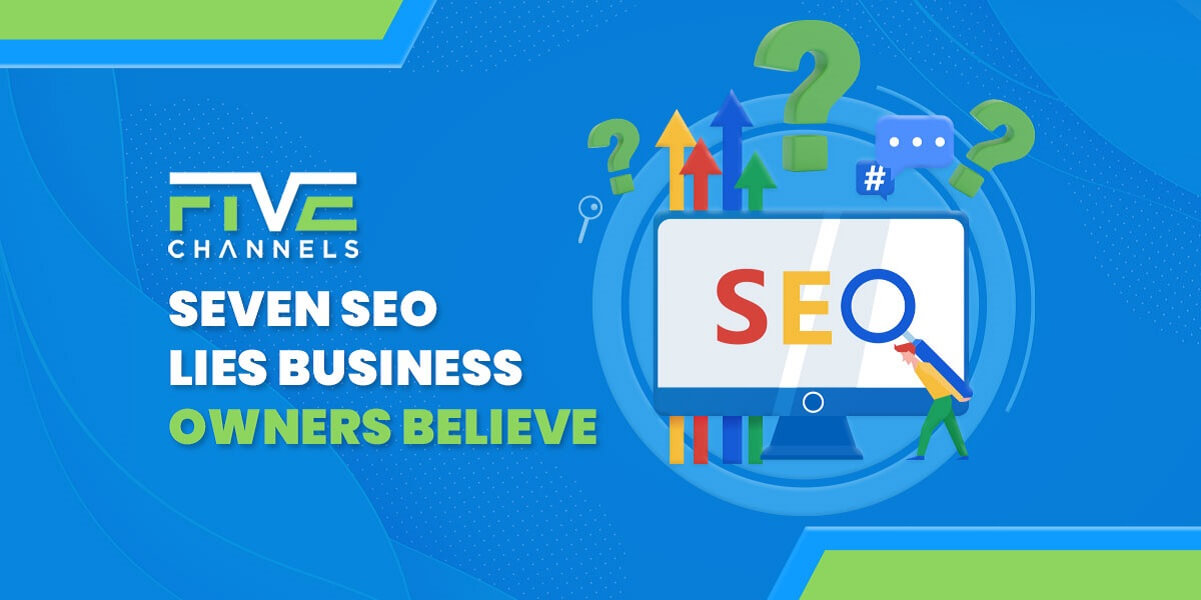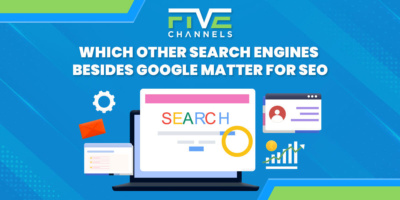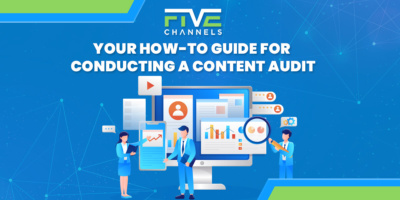The SEO industry is now worth upward of $80 billion, and it doesn’t show any signs of slowing down. That’s a good thing, as more business owners recognize how important search engine optimization is.
Unfortunately, not everyone understands what SEO can do. Since the industry is always evolving, there are plenty of opportunities for myths to arise. Many of these lead even savvy business owners to think they don’t need SEO, or they can handle it themselves.
Let’s shed some light on several of the most common lies business owners still believe. Once these myths are dispelled, you’ll have a better understanding of how SEO works and why it’s crucial for your business.

Myth #1: Your SEO Guide is Good Forever
This is one of the most common myths business owners believe about SEO. They think that “getting good SEO” is a one-time endeavor.
The idea here is that you can tweak a few things on your webpage, which will then send your page climbing the ranks. You write a few pieces of content, and you’re golden.
This isn’t how SEO works. Instead of thinking of SEO as a set-and-forget task, envision it as an ongoing process in your business.
Why should you think of SEO as an ongoing process? The simple truth is that it is one, for at least a couple of reasons. The first is that SEO is dynamic and ever-changing.
Think back to around 10 years ago, back when SEO first started becoming popular. Everything was about keywords. You could write a page with nothing more than your keyword over and over, and it would shoot up the ranks.
Flash-forward to today, and that kind of behavior is going to get Google to dish out some penalties. There’s even a name for this behavior…keyword stuffing.
If you were using an SEO guide from 10 years ago, though, you wouldn’t know any better. An SEO guide from even a couple of years ago is outdated. It won’t take into account Google’s mobile-first indexing or increases in voice search.
So, search trends and good SEO practices are always evolving and changing.
The other reason you can’t set-and-forget SEO is that you’re competing with other companies to get that coveted first spot. You might rank today, but your competitors will switch up their tactics in a bid to knock you from #1.
If you don’t stay on top of your SEO, your hard-won ranking will be a thing of the past.
Myth #2: Social Media Doesn’t Matter for SEO
This is another widespread myth about SEO. While it’s true that social media isn’t the biggest factor in your SEO, it does indeed have influence.
The first thing you want to keep in mind is that different search engines give different weights to factors. Google doesn’t put much emphasis on most aspects of social media, while Bing gives much more weight to social media when determining rankings.
Forgetting that there are other search engines often goes hand in hand with discounting social media. Both are SEO mistakes to avoid.
It’s also worth noting that Google does indeed factor social media into its rankings. First, Google considers social media as part of “social proof.” If people are sharing and liking your content, chances are your content is trustworthy and high quality.
This becomes a self-sustaining loop. As more people discover your content, they like and share it. As you rack up more social proof, your web traffic also increases, which encourages search engines to push you even higher in the rankings.
Your content is then even more visible, which draws in more traffic. More people then like and share, and the cycle repeats.
It’s also important to note that Google favors one social media platform in particular, YouTube. The Google-owned video powerhouse is one of the largest social media platforms out there, but it tends to be overlooked.
This could be really hurting your SEO. Google values good video SEO and will push your YouTube content to users in the search results too.
Long story short, if you’ve neglected your social media, it’s time to take another look at it as part of your SEO strategy.
Myth #3: Google Ranks 200 SEO Factors
This is a very common lie business leaders, and website owners are told. Google’s algorithm contains 200 factors.
There’s a grain of truth here. Back in 2009, a Google staffer revealed that the algorithm assesses more than 200 factors. Since then, it’s likely Google has dropped some factors while adding new ones.
It’s more accurate to say Google’s algorithm uses around 200 factors or probably more than 200 factors.
The other problem with this statement is that no one knows what all 200+ factors are. Google is tight-lipped about what they rank websites on, which means SEO often has an element of guesswork.
There are about eleven or so factors that are confirmed as part of the Google algorithm. These include website speed, mobile-friendliness, and linking factors. Everything else is a guess.
What’s more, is that some factors are more important than other factors. Even if you did know all the elements, you’d still want to focus on a few of these weightier factors.
Instead of trying to rank for all the factors or feeling overwhelmed by the sheer number of aspects Google looks at, zero in on the more important ones.
Myth #4: Keywords Don’t Matter
This is a newer myth, but it’s one that SEO experts have heard more often. It likely comes from the idea that you can’t stuff your keyword into your content and expect it to perform anymore.
That, plus the other factors in Google’s algorithm, has led to people saying keywords are “dead” or that they don’t matter.
It might be true that keywords aren’t the be-all, end-all that they were in the early days of SEO. That doesn’t mean you can or should ignore them entirely.
In fact, it’s as important to look at keywords as it was in the past. As much as SEO has evolved over the years, so have keywords.
Today, web crawlers are better at analyzing context that they were in the past. For that reason, you need to be sure you’re picking the right keywords. If you’re choosing irrelevant keywords, you’re not going to rank very high, even if you’re doing everything else right.
Search engines are also evolving to handle more naturalistic queries. Long-tail keywords and semantically correct questions are now common as keywords. Search engines are also better able to consider the differences between phrases like “information for teachers” and “information about teachers.”
If you’re offering teachers information, you don’t want to rank for “information about teachers.” Knowing this is key. Local search, voice search, and more are also making changes to the way people search.
Doing keyword research, including the right keywords, and using a mix of long-tail and short-tail keywords, are important parts of your SEO strategy.
Myth #5: SEO is for Robots
This incredibly pervasive myth started in the early days of SEO. Practices like keyword stuffing are custom-made for fooling web crawlers.
Over the years, search engines have evolved a lot. In turn, the robots they’re using are more sophisticated than ever.
What spurs their evolution is the desire to reflect human search users’ goals better. That’s why Google’s introduced things like the BERT update, which gives better natural speech processing.
It’s also why Google considers social proof and website speed so important. Visitors to your site also value these things. A fast website improves the user experience.
Search engines want to direct their users to the page with the best experience. In most cases, this is the content that best answers their question.
It also includes how quickly your page loads. You might have the best answer, but if your page loads too slowly, users will click away in frustration. Is an answer no one ever sees still the best answer?
Google and other search engines thus program their robots to check different aspects of the user experience. That’s what they’ve always done, even when keywords were the most important or only factor.
As users continue to change their expectations, so too will algorithms change. As technology improves, the “robots” you’re writing for will become even more human.
That’s why it helps to forget about the robots and instead write to satisfy your human audience. There are certain things you can do to optimize your content. At the end of the day, Google is only asking you to do things that improve your human visitors’ experience.
Myth #6: You Don’t Need Help With SEO
This is perhaps the most common SEO myth out there, and many business leaders believe it. They take the DIY approach to SEO. When they don’t see their ranking improve, they declare SEO “ineffective” or “unnecessary.”
In most cases, they weren’t doing SEO the right way. They may have been using an outdated SEO playbook, or they may have applied the “set-and-forget” mentality discussed above.
Many of the other myths on this list will also hamper your SEO efforts. You might not be aware of all the factors involved or which ones have the biggest impact.
You may also not be aware of changes to Google’s algorithm or what your competitors are doing. You might be unaware of changing trends in user search intent. Have you considered mobile trends, local search, or the rise of voice search?
All of these factors should be considered in SEO strategies. Many business leaders overlook them simply because they don’t know.
That’s why it’s so important to get the right SEO help. SEO experts are aware of the trends and changes in the SEO environment. They can help you design an SEO strategy that responds to those changes.
They’re also better positioned to track changes in your ranking and make tweaks to your SEO. Your team may not have the time to put in regularly. They may also not be monitoring or staying up to date.
By getting the experts on board, you can get better SEO and free up your own time.
Myth #7: You Don’t Need SEO for Digital Marketing Success
Of all the digital marketing strategies out there, SEO tends to get the short end of the stick. It could be because people have experimented with it and couldn’t drive the results they wanted. It could also be that business leaders see SEO as being too expensive.
They may also prefer banner ads or video ads. They probably feel more confident about these kinds of advertising because they’re more familiar.
If you plan to do any digital marketing though, you need to have SEO as part of your strategy.
Consider that 93 percent of all online sessions start with a search. More people are checking in with Google than with Facebook or Instagram. If your SEO isn’t top-notch, then you’re missing many of these users.
Beyond that, SEO also helps with your other digital marketing efforts. You’ve already seen how social media and SEO can reinforce each other.
SEO can also play into the success of your PPC ads on almost any platform. Your landing pages need to be optimized to really convert.
Good SEO also increases brand awareness and visibility. It can also increase brand trust. The next time someone sees an ad for your business, they’re more willing to click because they know the name.
In short, SEO provides a solid marketing foundation for everything else you do online. With good SEO, you’ll find your other marketing efforts have higher success rates.
Demystify SEO With the Right Help
With some luck, this SEO guide has exposed some of the more common lies you’ve heard and revealed the truth about SEO. With this knowledge in hand, you should be in a much better position to evaluate your SEO efforts.
Are you wondering if your current strategy is up to date? It might be time to book a review with the experts. With the right SEO team on your side, you can build a better foundation for all your digital marketing efforts.
Owner and Chief Marketing Officer, Jason Hall, and his team specialize in creating brand awareness / traffic and lead generation / marketing funnel and conversion optimization, while utilizing the appropriate marketing channels available within your industry. With diverse clients throughout the world, Jason's team is well connected within many industries to assist with your marketing strategies. With no long term contracts and various levels of service, Jason's team will increase the quality of your online traffic, leads, and sales.
About the author...
Located in the heart of the Emerald Coast - Destin, FL, founder and Chief Marketing Officer, Jason Hall, and his team specialize in creating brand awareness / traffic and lead generation / marketing funnel and conversion optimization / and PR campaigns, while utilizing the appropriate marketing channels available within your industry.
With diverse clients throughout the world, Jason's team is well connected within many industries to assist with your marketing strategies. With no long term contracts and various levels of service, Jason's team will increase the quality of your online traffic, leads, and sales.









